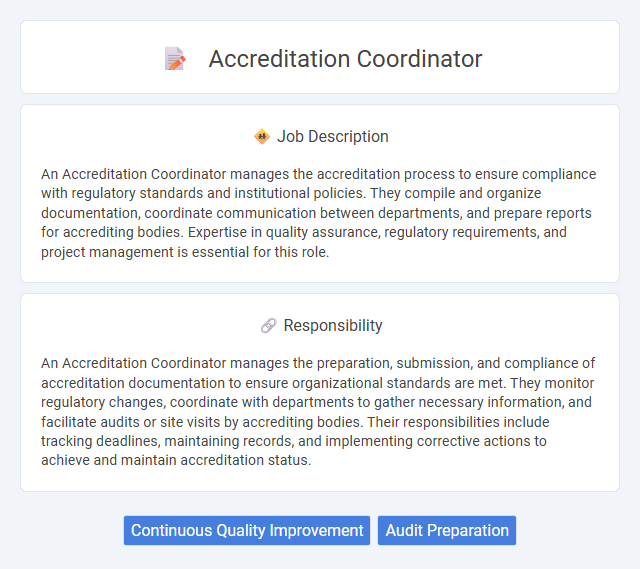
An Accreditation Coordinator manages the accreditation process to ensure compliance with regulatory standards and institutional policies. They compile and organize documentation, coordinate communication between departments, and prepare reports for accrediting bodies. Expertise in quality assurance, regulatory requirements, and project management is essential for this role.
Individuals with strong organizational skills and a detail-oriented mindset are likely suitable for the Accreditation Coordinator role, as the position requires managing complex documentation and deadlines. Those comfortable with constant communication and collaboration across departments may find themselves well-suited to the interpersonal demands of the job. Candidates who prefer routine and precision over ambiguity probably have a higher chance of excelling in this role.
Qualification
An Accreditation Coordinator must possess a bachelor's degree in education, healthcare, or a related field, often supplemented by certifications in accreditation standards and quality assurance. Strong knowledge of regulatory compliance, data analysis, and project management is essential to effectively oversee the accreditation process. Proven experience in coordinating audits, preparing documentation, and collaborating with cross-functional teams enhances the candidate's ability to ensure adherence to industry-specific accreditation requirements.
Responsibility
An Accreditation Coordinator manages the preparation, submission, and compliance of accreditation documentation to ensure organizational standards are met. They monitor regulatory changes, coordinate with departments to gather necessary information, and facilitate audits or site visits by accrediting bodies. Their responsibilities include tracking deadlines, maintaining records, and implementing corrective actions to achieve and maintain accreditation status.
Benefit
An Accreditation Coordinator likely enhances an organization's credibility by ensuring compliance with industry standards, which may improve client trust and open new market opportunities. This role probably supports continuous improvement initiatives, potentially leading to higher operational efficiency and quality outcomes. Overall, the position might contribute to risk mitigation by systematically managing accreditation processes and documentation.
Challenge
The Accreditation Coordinator role likely involves navigating complex regulatory standards and managing extensive documentation, which can present significant challenges. Coordinators probably face tight deadlines and the need for precise communication among diverse stakeholders. Successfully balancing these demands may require strong organizational skills and adaptability to ensure all accreditation criteria are met efficiently.
Career Advancement
An Accreditation Coordinator plays a vital role in managing and organizing accreditation processes, ensuring compliance with regulatory standards and enhancing institutional credibility. Mastery in accreditation management, data analysis, and stakeholder communication significantly boosts career advancement opportunities in educational administration, healthcare, and corporate settings. Progression often leads to senior roles such as Accreditation Manager, Quality Assurance Director, or Compliance Officer, with increased responsibility for strategic planning and regulatory oversight.
Key Terms
Continuous Quality Improvement
An Accreditation Coordinator plays a crucial role in Continuous Quality Improvement by managing the collection and analysis of compliance data to ensure adherence to accreditation standards. They develop and implement quality assurance processes that promote ongoing evaluation and enhancement of organizational performance. Their expertise supports sustained excellence in program delivery through systematic monitoring and reporting aligned with regulatory requirements.
Audit Preparation
An Accreditation Coordinator specializes in audit preparation by organizing documentation, ensuring compliance with regulatory standards, and coordinating internal reviews to support successful accreditation outcomes. They manage timelines and communicate with various departments to gather necessary evidence and address any discrepancies. Expertise in regulatory requirements and quality management systems is essential for accurate and efficient audit readiness.
 kuljobs.com
kuljobs.com